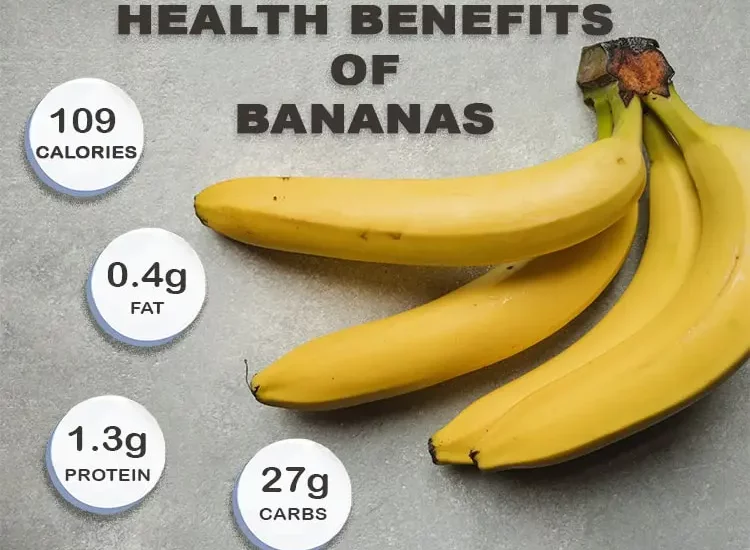CHEST | SHOULDERS | BICEPS | TRICEPS | LEG | ABS | PROTEIN FOOD
Are you curious about the nutritional value of bananas? A frequent concern people have is ‘How many calories does a banana have ?‘. Bananas are the most popular fruit known for its rich nutrient content and have many health benefits. They are the source of all important nutrient needed by our body including potassium, fiber content, vitamin C, vitamin B6, iron and calcium.
How many calories does a banana have ?
One medium size banana approx ( 122 grams ) contains the following nutrients :
- Calories: 109
- Total fat: 0.4 grams
- Saturated fat: 0 grams
- Cholesterol: 0 milligrams
- Sodium: 1 milligram
- Total carbohydrates: 27.86 grams
- Dietary fiber: 3 grams
- Sugar: 14 grams
- Protein: 1.33 gram
- Vitamin A: 81 IU
- Vitamin C: 9 milligrams
- Calcium: 6 milligrams
- Iron: 0.3 milligrams
In addition to above banana calories, they also contain some other small amounts of other minerals and nutrients, including zinc, calcium and selenium. They are the kind of natural fruits that grow on the trees (Musa acuminata or Musa balbisiana) that belongs to the jungles. Bananas are considered as one of the most popular fruits in the world. They contain a lot of nutrients and can be eaten fresh or after cooking. Bananas can be added to lot of dishes including cakes, smoothies, oat meal and pies etc.
There are many different types of bananas, Pisang Raja, Red Banana, Cavendish Banana and Apple banana. Cavendish is the most common banana, often found in the supermarkets. They are grown in many countries, including United States, China and India etc. Bananas can be eaten as snacks and also they can be used in variety of dishes including cakes, bread, desserts and main courses etc. Bananas are low in fat and calories, so they are a good choice for people who are trying to maintain weight.
Nutritional Facts About Bananas
Fiber – Bananas are the rich source of fiber, it contains about 4 grams of fiber per medium size ( 122 gram ) banana. They mainly contain insoluble fiber , which promotes regular bowl movements. By feeding the bacteria living in the gut, insoluble fiber support the health of the digestive system. Bananas also contain small amount of soluble fiber, which helps to keep lower cholesterol levels and regulate blood sugar level.
Vitamin C – Bananas are also a good source of vitamin c, with 9 milligrams of vitamin c per medium size banana. Vitamin C is very important nutrient for our skin, it helps to keep our skin healthy. It helps in growth and repair of tissues by producing collagen. It also works as an antioxidant, means it protects your skin from damage caused by fire radicals. Our body do not produce or store vitamin C, so it is very important to add source of vitamin C in your meal.
Vitamin B6 – Bananas contain about 0.4 milligrams of vitamin B6 per medium size banana. It is a water soluble vitamin, that plays an important role in many body functions. It helps to maintain normal nerve function by converting the food into energy. They also helps in production of red blood cells.
Potassium – Bananas are high in potassium, it is a mineral that helps in maintaining normal heart function and regulates the blood pressure. A medium size banana nearly 122 grams contains 422 milligrams of potassium. It is very important for an adult to consume at least 4500 milligrams of potassium per day.
Magnesium – It is an important mineral which helps in maintaining proper muscle function and a healthy immune system. A medium size banana contains about 30 milligrams of magnesium. It is recommended for adult to consume at least 415 milligrams of of magnesium per day.
Manganease – Manganese is known as trace mineral which is important for proper functioning of our body. This mineral helps in the conversion of carbohydrates, amino acids and cholesterol into energy. A medium size banana contains about 0.3 milligrams of this mineral. Also, our body needs only a small amount of this mineral per day.
Carbohydrates – Banana is a great source of carbohydrates. A medium size banana about 122 grams contain about 27.86 grams of total carbohydrates, that seems to be a lot. Carbohydrates plays an important role of energy in the body. That’s why it is recommended to eat 2-3 bananas before going to gym, as they are used by our body to fuel physical activities.
Health Benefits Of Bananas
Bananas are healthy and nutritious rich fruit that can provide a variety of health benefits.
Regulate blood pressure
Due to the presence of potassium, bananas helps regulate blood pressure. The mineral present in bananas work by reducing the effect of sodium, which can cause an increase in blood pressure.
By regulate blood pressure, it also prevent heart disease and stroke. A medium size banana ( 122 g ) contains about 450-500mg of potassium, which is about 10% of daily recommended intake for adults.
Fiber content
Bananas are a good source of dietary fiber, which helps in better digestion. Fiber keeps the digestive system functioning properly by promoting regular bowel movements. That’s why fiber is consider as an important component of a healthy diet.
So, (122 g) of banana contains 3 gram of dietary fiber, which is about 10%-15% of the daily recommended intake for adults.
For weight loss
Adding bananas in you daily diet can be very beneficial if your goal is weight loss. This is because bananas are low in calories but, high in many other nutrients that are important for maintaining a healthy weight.
Dietary fiber present in banana helps you feel full after a meal, which may prevent weight gain by reducing overall calorie intake. Bananas also contain other nutrients like potassium, vitamin B6 and magnesium. These nutrients can help in weight loss by regulating blood sugar levels and by supporting metabolism.
Beneficial for digestion
Due to the presence of high fiber and the nutrient content bananas can be beneficial for digestion. Due to the presence of fiber, the process of regular bowel movement keep going and helps to prevent constipation.
That’s why gym trainers recommended every gym student to eat banana 1 hour before the gym, in order to digest all the food you eat before. Eating banana help your stomach feel comfort and relieve acid reflux.
Blood sugar
Bananas are very beneficial for controlling blood sugar due to the presence of many nutrients and due to it low glycemic index. This is a scale used for measuring how fast blood sugar level increases after eating food.
People with diabetes or other conditions that affects blood sugar level, should eat food having medium to low glycemic index like bananas. As we know, bananas contain fiber and this fiber help to slow down the absorption of sugar into the bloodstream, which helps to keep stable blood sugar level.
Energy booster
Due to the presence of high carbohydrates content, banana works as the natural source of energy. Carbohydrates are the source main source of energy in the body, it breaks down into glucose which is used foe energy.
The thing which makes bananas a good choice for an energy boost is its low calories content than other fruits. That’t why bananas are used as a pre-workout meal that may help you provide energy during your workout without taking excess calories.
Potential downsides to eating bananas
Allergies : Bananas can be sensitive for some people because of certain amines that are present in the fleshy part of the banana, although it is not very common. This allergies may include symptoms like itching, selling of throat, tongue, lips and difficulty in breathing etc. If these type of allergies happened to you, then should seek immediate medical treatment. If you found allergy by eating bananas, that stop eating banana and other products containing banana.
Pesticides : Some bananas may be treated with pesticides in order to kill pests, such as fungi, weeds and insects during cultivation of bananas. This can be very dangerous for human health if proper precautions not followed. Follow some tips for your safety, choose an organic bananas or wash It properly in order to remove any residue. Proper handling and storage of bananas can help reduce the risk of contamination from pesticides and other harmful contaminants.
High in sugar : Bananas can be dangerous for people with blood sugar sensitives and can be contribute to gain weight, because of high amount of natural sugar present in bananas. Be aware of serving size whenever you are going to eat bananas. Keep in mind to calculate calories and sugar you are taking through a banana. An average size banana (122 g) contains 105 calories and 14 grams of sugar which a good portion size for most of the people. Bananas are very beneficial, if eat with proper portion size.
Digestive issues : For some people eating bananas can cause digestive issue, like bloating, gas and constipation etc if a person has a sensitive stomach. Also, bananas are high in fiber, so for many people it can be difficult to digest and cause constipation. Another reason may be, if a person having condition that affects the ability to absorb fructose found in bananas. Symptoms of this condition include abdominal pain, bloating etc.
Ensure bananas freshness and safety
- First ensure that there should be a no sign of damage or bruising at the time of purchasing, select ripe bananas with yellow skin.
- If your bananas become overripe, then use them in baking, smoothies or in other snack.
- Keep the bananas at room temperature for proper ripening, after that place them in the refrigerator to slow down the process of ripening in order to use them for more days.
- Peel banana before eating or using in any dishes to prevent it from browning.
- Bananas produce gas called ethylene gas which can faster the repining process of other fruits or vegetables, so place bananas away from other fruits and vegetables.
- Remove and discard any over-ripen banana as soon as possible to prevent the spread of decay to other bananas.
- Always wash banana with clean water before eating to remove any dust.
Are Bananas Fattening or Weight-Loss-Friendly?
Bananas contain a lot of nutrients which make them a good choice to add in weight loss diet. They are a good source of vitamins, fibers and minerals, which provide us the natural energy. Also bananas are low in calories, it contain something 109 calories in average 122 grams of banana.
Keep in mind that bananas also contain natural sugar. So,bananas can be dangerous for people with blood sugar sensitives and can be contribute to gain weight, because of high amount of natural sugar present in bananas.
Try to calculate calories and sugar you are taking through a banana in a day. Overall, bananas are very beneficial if eaten in limit.
Different varieties of bananas
There are many different varieties of bananas, having different flavour, texture and nutritional facts. Some popular varieties are :
Cavendish bananas : This is the most popular variety, available in the market in large quantity. They have sweet taste with creamy texture. They are yellow when ripe.
Burro bananas – This type of banana commonly grown in Southeast Asia, particularly in Malaysia and Indonesia. They are small and like having round shape, with dense texture and a slightly tart flavour.
Gros Michel Bananas – These were the most popular bananas in the first half of 20th century. They were known for their taste, more sweeter and flavourable than Cavendish bananas. Due to the fungus called panama disease, these bananas lost their market and no longer grown commercially.
Plantain bananas – These varieties of bananas also known as cooking bananas, because they are less sweet and are often used I savoury dishes. These types of bananas are typically larger, with thick skin as compared to other varieties. They are widely grown in Africa, Asia and Latin America.
Lady Finger bananas – These varieties of bananas are also known as finger or baby bananas. They more sweeter and having thin shape than regular bananas. These bananas are high in potassium, dietary fiber etc. They are widely grown in countries like Australia, Indonesia and South Africa or many more.
Red bananas – These are the varieties of bananas known for their red skin. These bananas are high in potassium, dietary fiber and vitamin C. They are usually grown in countries like Australia, Indonesia and India.
Nutritious Banana Recipes for a Fit Journey
Banana in bread – You can eat banana by cutting into slices and put in two pieces of bread. You can also spread some peanut butter or almonds.
Banana oatmeal – Take 200 ml of milk in a bowl and then add two bananas by cutting them into small pieces or you can also add 10-15 almonds.
Banana shake – For this smoothie you need two bananas, 250-300ml of milk, 10 almonds and 2 spoon of your favourite peanut butter, then mix all of them in mixture.
Banana ice cream – Blend frozen banana in high speed blender until they become creamy and resemble ice-cream.
Banana pancake – Mix mashed banana in your pancake for added nutrition and flavour.
How many bananas should you eat?
One medium size banana approx 122 grams contains 109 calories and 16 grams of sugar. Eating one medium size banana can provide a good source of nutrients such as potassium , vitamin B6 and dietary fiber.
But, the question was how many bananas should individual eat ? The number of bananas that should consume depends on individual needs. For example if your aim is too loss weight, then it is recommended to eat only 1-2 bananas in a day. If you are a player and need more energy then you can eat more bananas.
With so many benefits, bananas are also high in natural sugar. So, eating more bananas can contribute to weight gain.
So, it’s very important to calculate your daily need and now you may know the answer to the question “how many calories in a banana ?”.
How many calories in banana pudding ?
The calories of the banana pudding in 100g may differ based on the particular recipe and the ingredients you are using. The banana pudding could have approximately 140-240 calories for 100 grams. It includes components such as vanilla wafers, custard, pudding, bananas, and whipping cream.
How many calories in a large banana ?
The calories of a large-sized banana may differ slightly based on its size and ripeness. But on average, a large banana (approximately 7-9 inches long) usually has between 130 to 120 calories.
How much magnesium is in a banana?
The amount of magnesium in the banana may vary based on the size and ripeness; however, on average, the medium size banana (about 8 inches long) is a good source of 33 milligrams of magnesium.
How long is banana bread good for ?
The longevity of the banana bread is contingent on various aspects, including how it’s stored and the ingredients to make the bread. If stored properly, banana bread lasts between 2 and 4 days at room temperature. However, by using proper storage methods, it can last longer.
howmany carbs in a banana , howmany calories in a banana







